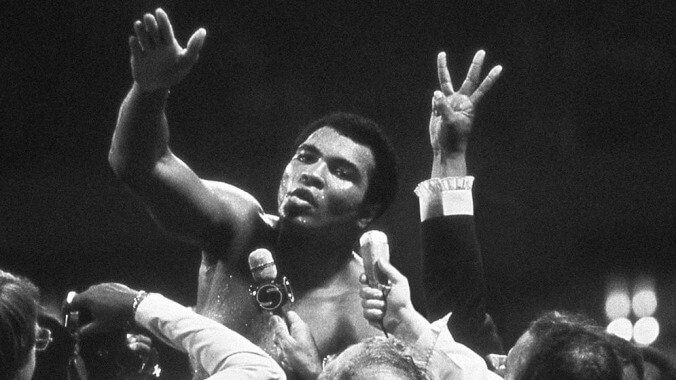Throughout Ken Burns’ long career as a documentarian and a PBS pledge-drive favorite, he and his team of collaborators have generally worked in two modes. Sometimes they go big, taking on huge topics like jazz, baseball, country music, national parks, and wars. And sometimes they go small, crafting detailed portraits of major cultural figures like Ernest Hemingway, Jackie Robinson, Frank Lloyd Wright, and the Roosevelts. In either case, Burns’ team uses their subjects as a way to explore the best and worst of American history: the larger-than-life celebrities, the racial and class strife, and the ways some brilliant men and women have used the ideals of liberty to inspire others.
Want to know more about Ali’s conversion to Islam and his friendship with Malcolm X? Netflix’s Blood Brothers is a very good documentary about that very topic. Interested in Ali’s three-year exile from boxing, when he fought in court to prove he was a legitimate conscientious objector to the Vietnam War? That’s covered splendidly in the 2013 doc The Trials Of Muhammad Ali. Ali’s thrilling mid-’70s comeback, culminating in the defeat of George Foreman in the legendary “Rumble In The Jungle” match? Leon Gast won an Oscar for his brilliant 1996 film about it, When We Were Kings. An over-the-hill Ali using racially charged language to humiliate his former friend Larry Holmes before a title fight? Cinematic luminary Albert Maysles explored that in the great 2009 30 For 30 episode “Muhammad And Larry.” There are nonfiction films about his final Joe Frazier bout, and about how it felt to face Ali; just two years ago, director Antoine Fuqua and HBO produced a career-spanning doc.
The Burns/Burns/McMahon Muhammad Ali documentary runs for over seven hours, but it doesn’t tackle any one topic in as much depth as most of the aforementioned films. Yet each of those docs does in its own way cover the larger arc of Ali’s life, framed by the smaller fragments. The same can be said of director Michael Mann’s outstanding 2001 biopic Ali, with Will Smith playing the champ during the heady decade between 1964 and 1974; as well as Regina King’s 2020 adaptation of Kemp Powers’ play One Night In Miami, with Eli Goree giving a great performance as Ali, hanging out with Malcolm X, Jim Brown and Sam Cooke after winning his first heavyweight title.
So there’s the bad news: The Ken Burns collective has been scooped this time out. There just aren’t that many juicy Ali anecdotes that haven’t been told, and told a lot. As for the good news? Well, for anyone who doesn’t want to watch a half-dozen other movies to learn more about the life and times of Muhammad Ali, this new series will definitely suffice.
Burns and company don’t shake up their house style here. Muhammad Ali leans heavily on an authoritative-sounding narrator (Keith David, in this case), alongside thoughtful comments from excellent journalists and writers (including David Remnick, who wrote one of the best books about Ali, King Of The World), in between still photographs and vintage clips that in some cases haven’t been seen before by anyone other than archivists. Boxing fans in particular should love how much of these seven-plus hours are dedicated to extended footage of Ali’s fights, supported by keen analysis. (The doc’s creative team subtly enhances those old broadcasts, adding quietly atmospheric sound effects to help make them feel more visceral.)
This, again, is not that unusual for films about Ali. When We Were Kings, for one, is like a graduate-level seminar in fight technique. Still, one advantage that this series does have over the previous documentaries is that the experts are able to chart the changes in how Ali boxed across his 20 years as a pro: from the young man who danced around the ring and had a quick enough reaction-time to duck backward from punches, to the middle-aged monolith who stood his ground and took blow after blow, ultimately suffering permanent damage.
There are times when the tried-and-true Ken Burns narrative style improves the material. One of Burns’ most useful tools has always been digression, which he uses to introduce a new character or concept before taking a few minutes (or longer) to explore its history and meaning. Here, that technique is most frequently applied to Ali’s biggest rivals: Sonny Liston, Joe Frazier, George Foreman, and Larry Holmes. This series gives each of these men his due, telling their stories and making it clear that with just the slightest shifts in perspective, they could be the heroes of their matches, with Ali as the heavy.
Throughout, Muhammad Ali remains clear-eyed about the contradictions of its subject. Seen one way, the legend of Ali is about a man who overcame both overt and institutionally ingrained racism to become a rich and famous icon of freedom. Seen another way, he was the handsome, shrewd, coddled darling of the establishment press—and of his wealthy, white Kentucky backers, who loved to hear him talk about how ugly, dumb, and primitive his opposition was, because it validated their own prejudices. Ali was a prodigious womanizer, yet his ex-wives were still willing to talk in this doc about how much they loved him. He was an oft-absent father whose kids (or at least the ones interviewed here) insist he was a wonderful parent. He betrayed friends like Holmes and Malcolm X, but would give the shirt off his back (plus a few hundred bucks) to strangers.
Muhammad Ali also tracks an evolution in public opinion. Thanks to his talent and charisma, Ali was one of the most famous fighters in the world before he won his first professional title; yet for many Americans back then he was the heel they loved to hate. Initially, his objection to the Vietnam War turned him (for some) from a cartoon villain to a widely despised traitor; but his persistence in court combined with a willingness to keep stepping into the ring after he’d clearly lost a step eventually wore down a lot of doubters. By the time a retired and visibly weakened Ali lit the Olympic torch at the 1996 Atlanta games, he’d become almost universally beloved.
So yes, of course: Muhammad Ali is absorbing, insightful, and easy to watch—everything one would expect from a Ken Burns production about a true American hero. In Muhammad Ali terms though, this series is closer to the mid-’70s than the mid-’60s Ali. It’s more dogged than spry. At one point in this series, the novelist Walter Mosely sticks up for Ali’s first big opponent Sonny Liston, calling him “a great American hero” who fought his way up from nothing to the championship, only to wind up becoming a relatively minor character in the very public saga of a man who was getting Life magazine photo-spreads in his early 20s. Mosely talks about Liston’s hardscrabble past, saying he was “from back there.” For a moment, hearing Mosely wax poetic about Liston, it’s hard not to think that as great as Ali was—“The Greatest,” even—that maybe this was the time to put someone in the spotlight who wasn’t already one of the 20th century’s most well-documented people.


 Keep scrolling for more great stories.
Keep scrolling for more great stories.
